Global Team Management: Challenges, Strategies, and Solutions
VerifiedAdded on 2020/03/07
|11
|2717
|34
Report
AI Summary
This research proposal explores the multifaceted challenges encountered in managing global teams within multinational companies (MNCs). The study delves into issues such as cultural differences, communication barriers, and the complexities of outsourcing innovation, which impact human resource management. The objectives include identifying challenges, developing effective strategies, and addressing the outsourcing of innovation. The research employs a mixed-methods approach, combining qualitative interviews with managers and quantitative surveys with employees to gather comprehensive data. Key research questions address the challenges faced, strategies for improvement, and management of innovation outsourcing. The methodology involves a literature review, research questions, and a detailed time schedule. The research aims to provide practical insights and strategies for MNCs to enhance global team performance and overcome these challenges. Limitations include time and resource constraints, potentially affecting the depth of literature analysis and data collection. The findings are expected to offer valuable insights for improving global team management practices.
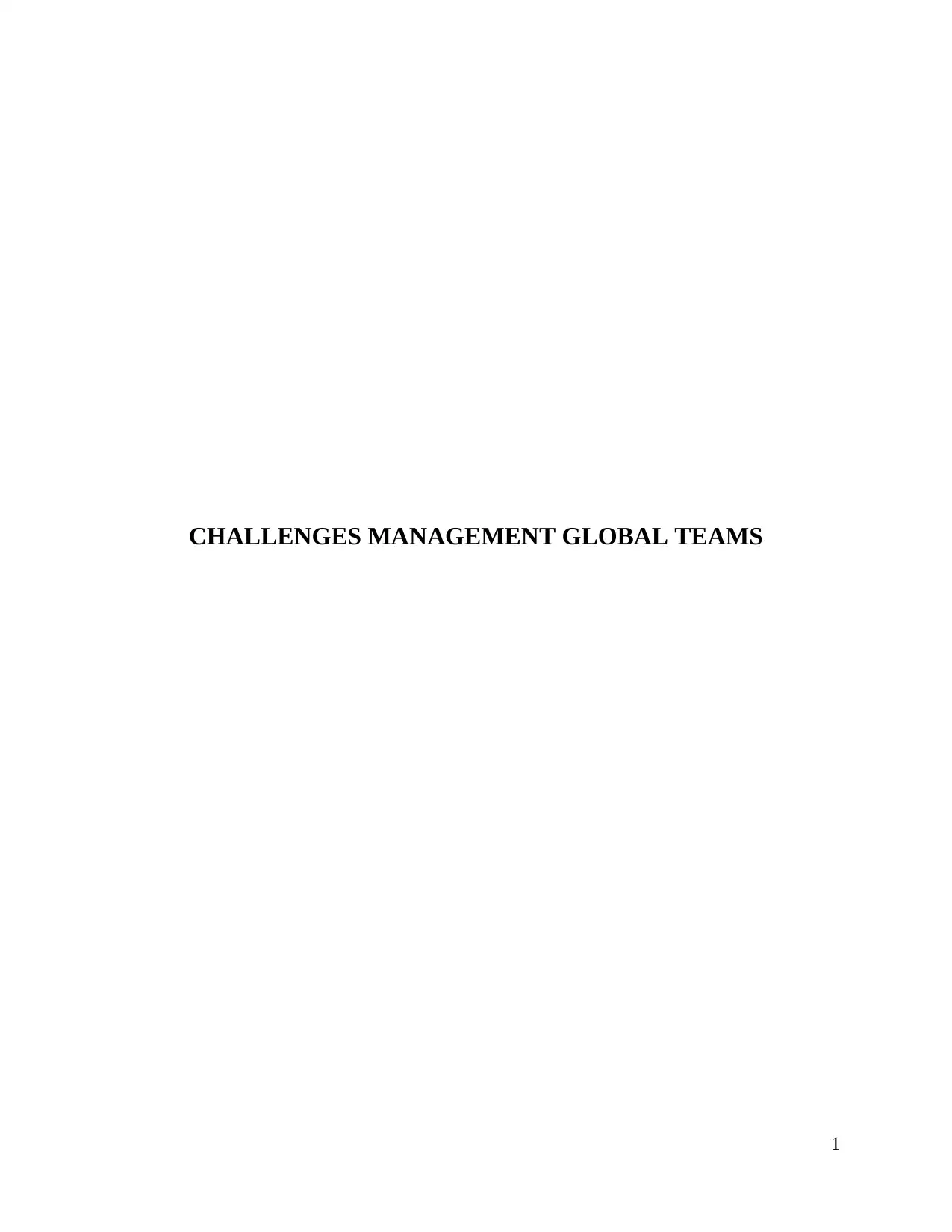
CHALLENGES MANAGEMENT GLOBAL TEAMS
1
1
Paraphrase This Document
Need a fresh take? Get an instant paraphrase of this document with our AI Paraphraser
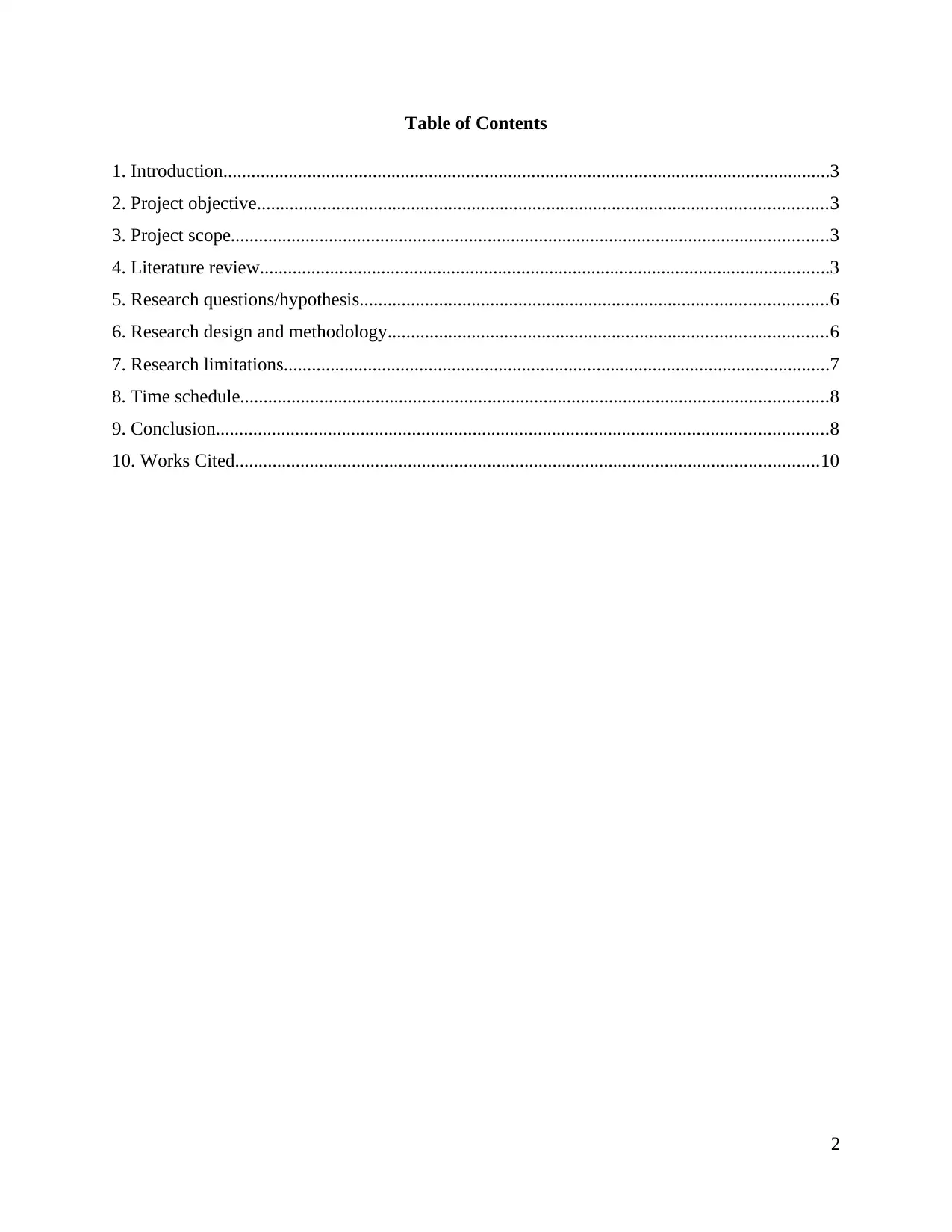
Table of Contents
1. Introduction..................................................................................................................................3
2. Project objective..........................................................................................................................3
3. Project scope................................................................................................................................3
4. Literature review..........................................................................................................................3
5. Research questions/hypothesis....................................................................................................6
6. Research design and methodology..............................................................................................6
7. Research limitations.....................................................................................................................7
8. Time schedule..............................................................................................................................8
9. Conclusion...................................................................................................................................8
10. Works Cited.............................................................................................................................10
2
1. Introduction..................................................................................................................................3
2. Project objective..........................................................................................................................3
3. Project scope................................................................................................................................3
4. Literature review..........................................................................................................................3
5. Research questions/hypothesis....................................................................................................6
6. Research design and methodology..............................................................................................6
7. Research limitations.....................................................................................................................7
8. Time schedule..............................................................................................................................8
9. Conclusion...................................................................................................................................8
10. Works Cited.............................................................................................................................10
2
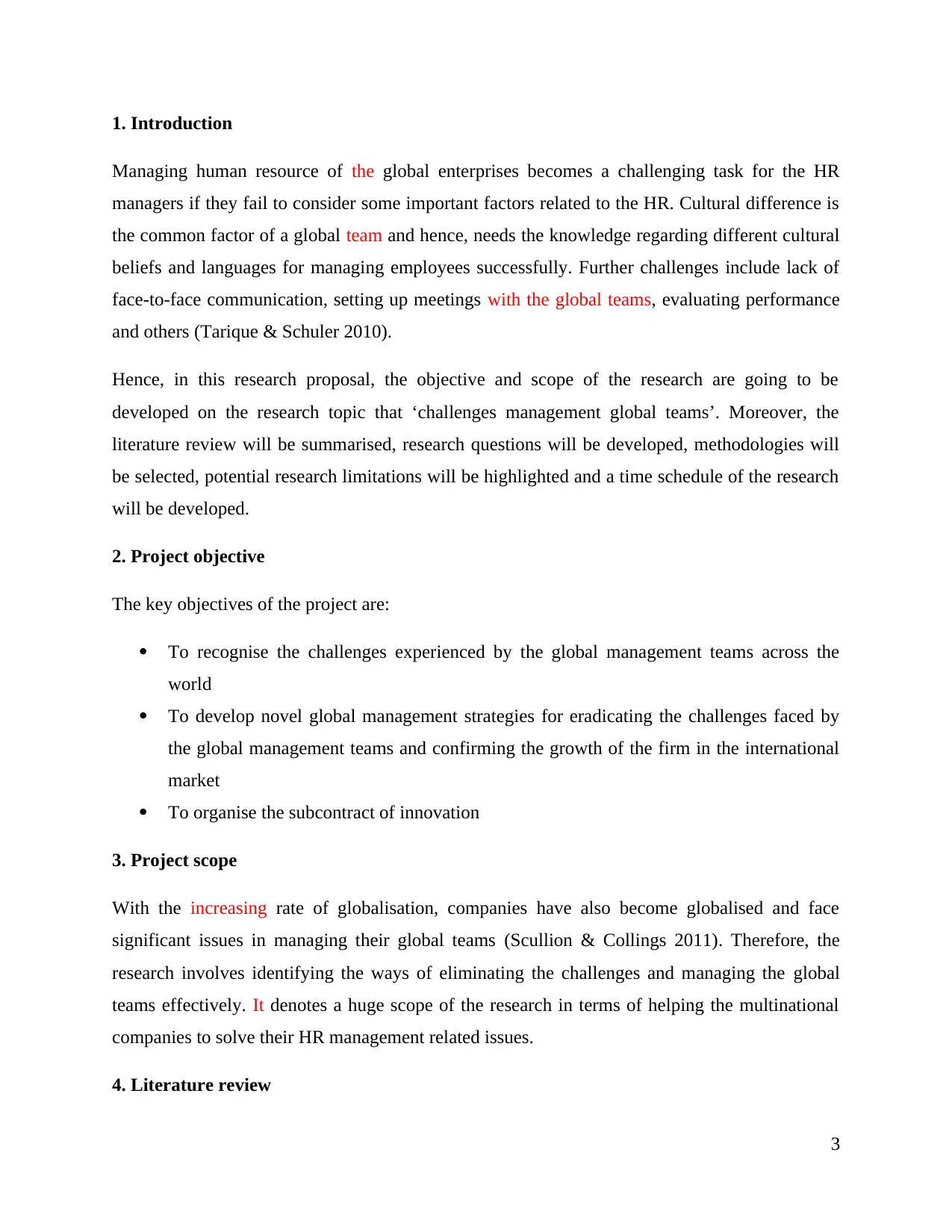
1. Introduction
Managing human resource of the global enterprises becomes a challenging task for the HR
managers if they fail to consider some important factors related to the HR. Cultural difference is
the common factor of a global team and hence, needs the knowledge regarding different cultural
beliefs and languages for managing employees successfully. Further challenges include lack of
face-to-face communication, setting up meetings with the global teams, evaluating performance
and others (Tarique & Schuler 2010).
Hence, in this research proposal, the objective and scope of the research are going to be
developed on the research topic that ‘challenges management global teams’. Moreover, the
literature review will be summarised, research questions will be developed, methodologies will
be selected, potential research limitations will be highlighted and a time schedule of the research
will be developed.
2. Project objective
The key objectives of the project are:
To recognise the challenges experienced by the global management teams across the
world
To develop novel global management strategies for eradicating the challenges faced by
the global management teams and confirming the growth of the firm in the international
market
To organise the subcontract of innovation
3. Project scope
With the increasing rate of globalisation, companies have also become globalised and face
significant issues in managing their global teams (Scullion & Collings 2011). Therefore, the
research involves identifying the ways of eliminating the challenges and managing the global
teams effectively. It denotes a huge scope of the research in terms of helping the multinational
companies to solve their HR management related issues.
4. Literature review
3
Managing human resource of the global enterprises becomes a challenging task for the HR
managers if they fail to consider some important factors related to the HR. Cultural difference is
the common factor of a global team and hence, needs the knowledge regarding different cultural
beliefs and languages for managing employees successfully. Further challenges include lack of
face-to-face communication, setting up meetings with the global teams, evaluating performance
and others (Tarique & Schuler 2010).
Hence, in this research proposal, the objective and scope of the research are going to be
developed on the research topic that ‘challenges management global teams’. Moreover, the
literature review will be summarised, research questions will be developed, methodologies will
be selected, potential research limitations will be highlighted and a time schedule of the research
will be developed.
2. Project objective
The key objectives of the project are:
To recognise the challenges experienced by the global management teams across the
world
To develop novel global management strategies for eradicating the challenges faced by
the global management teams and confirming the growth of the firm in the international
market
To organise the subcontract of innovation
3. Project scope
With the increasing rate of globalisation, companies have also become globalised and face
significant issues in managing their global teams (Scullion & Collings 2011). Therefore, the
research involves identifying the ways of eliminating the challenges and managing the global
teams effectively. It denotes a huge scope of the research in terms of helping the multinational
companies to solve their HR management related issues.
4. Literature review
3
⊘ This is a preview!⊘
Do you want full access?
Subscribe today to unlock all pages.

Trusted by 1+ million students worldwide
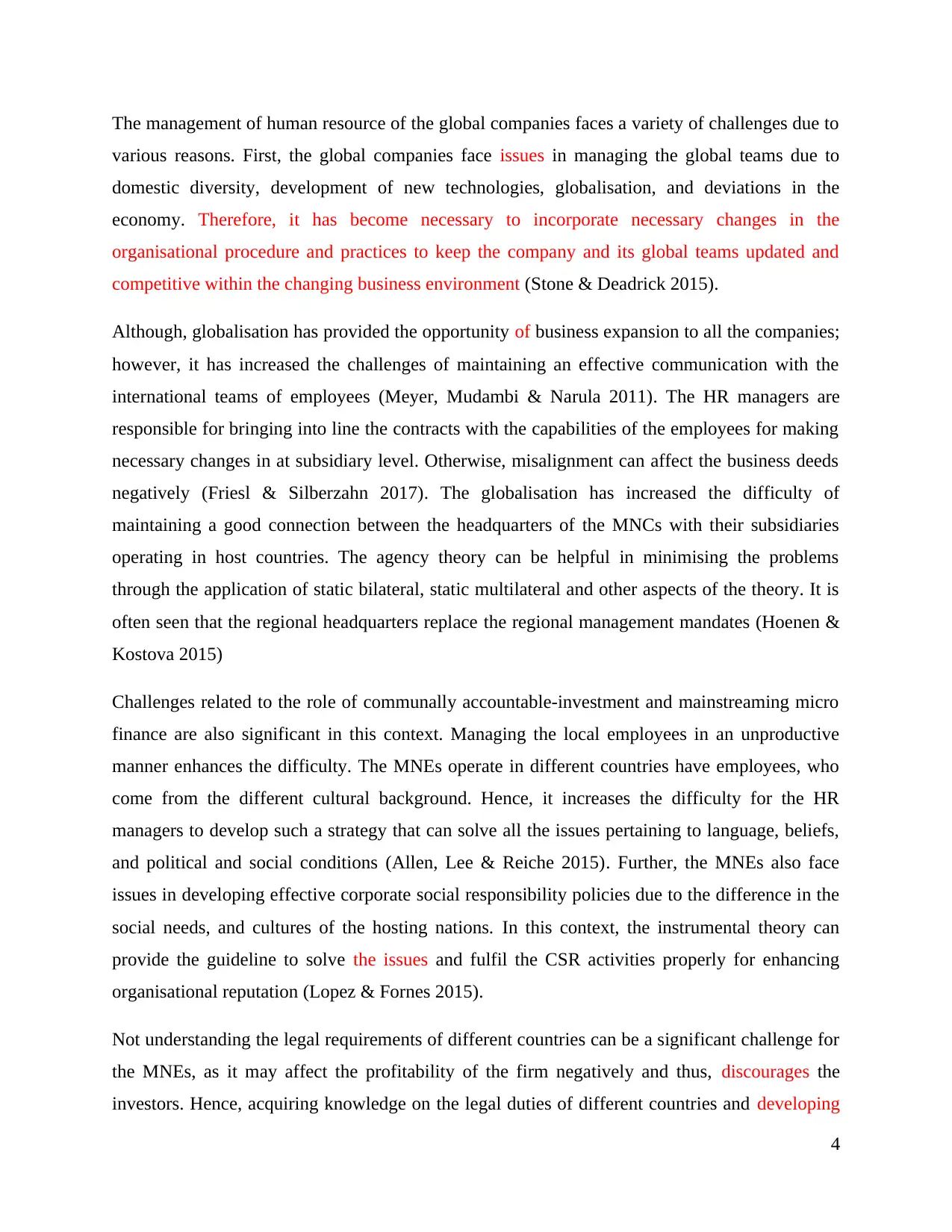
The management of human resource of the global companies faces a variety of challenges due to
various reasons. First, the global companies face issues in managing the global teams due to
domestic diversity, development of new technologies, globalisation, and deviations in the
economy. Therefore, it has become necessary to incorporate necessary changes in the
organisational procedure and practices to keep the company and its global teams updated and
competitive within the changing business environment (Stone & Deadrick 2015).
Although, globalisation has provided the opportunity of business expansion to all the companies;
however, it has increased the challenges of maintaining an effective communication with the
international teams of employees (Meyer, Mudambi & Narula 2011). The HR managers are
responsible for bringing into line the contracts with the capabilities of the employees for making
necessary changes in at subsidiary level. Otherwise, misalignment can affect the business deeds
negatively (Friesl & Silberzahn 2017). The globalisation has increased the difficulty of
maintaining a good connection between the headquarters of the MNCs with their subsidiaries
operating in host countries. The agency theory can be helpful in minimising the problems
through the application of static bilateral, static multilateral and other aspects of the theory. It is
often seen that the regional headquarters replace the regional management mandates (Hoenen &
Kostova 2015)
Challenges related to the role of communally accountable-investment and mainstreaming micro
finance are also significant in this context. Managing the local employees in an unproductive
manner enhances the difficulty. The MNEs operate in different countries have employees, who
come from the different cultural background. Hence, it increases the difficulty for the HR
managers to develop such a strategy that can solve all the issues pertaining to language, beliefs,
and political and social conditions (Allen, Lee & Reiche 2015). Further, the MNEs also face
issues in developing effective corporate social responsibility policies due to the difference in the
social needs, and cultures of the hosting nations. In this context, the instrumental theory can
provide the guideline to solve the issues and fulfil the CSR activities properly for enhancing
organisational reputation (Lopez & Fornes 2015).
Not understanding the legal requirements of different countries can be a significant challenge for
the MNEs, as it may affect the profitability of the firm negatively and thus, discourages the
investors. Hence, acquiring knowledge on the legal duties of different countries and developing
4
various reasons. First, the global companies face issues in managing the global teams due to
domestic diversity, development of new technologies, globalisation, and deviations in the
economy. Therefore, it has become necessary to incorporate necessary changes in the
organisational procedure and practices to keep the company and its global teams updated and
competitive within the changing business environment (Stone & Deadrick 2015).
Although, globalisation has provided the opportunity of business expansion to all the companies;
however, it has increased the challenges of maintaining an effective communication with the
international teams of employees (Meyer, Mudambi & Narula 2011). The HR managers are
responsible for bringing into line the contracts with the capabilities of the employees for making
necessary changes in at subsidiary level. Otherwise, misalignment can affect the business deeds
negatively (Friesl & Silberzahn 2017). The globalisation has increased the difficulty of
maintaining a good connection between the headquarters of the MNCs with their subsidiaries
operating in host countries. The agency theory can be helpful in minimising the problems
through the application of static bilateral, static multilateral and other aspects of the theory. It is
often seen that the regional headquarters replace the regional management mandates (Hoenen &
Kostova 2015)
Challenges related to the role of communally accountable-investment and mainstreaming micro
finance are also significant in this context. Managing the local employees in an unproductive
manner enhances the difficulty. The MNEs operate in different countries have employees, who
come from the different cultural background. Hence, it increases the difficulty for the HR
managers to develop such a strategy that can solve all the issues pertaining to language, beliefs,
and political and social conditions (Allen, Lee & Reiche 2015). Further, the MNEs also face
issues in developing effective corporate social responsibility policies due to the difference in the
social needs, and cultures of the hosting nations. In this context, the instrumental theory can
provide the guideline to solve the issues and fulfil the CSR activities properly for enhancing
organisational reputation (Lopez & Fornes 2015).
Not understanding the legal requirements of different countries can be a significant challenge for
the MNEs, as it may affect the profitability of the firm negatively and thus, discourages the
investors. Hence, acquiring knowledge on the legal duties of different countries and developing
4
Paraphrase This Document
Need a fresh take? Get an instant paraphrase of this document with our AI Paraphraser
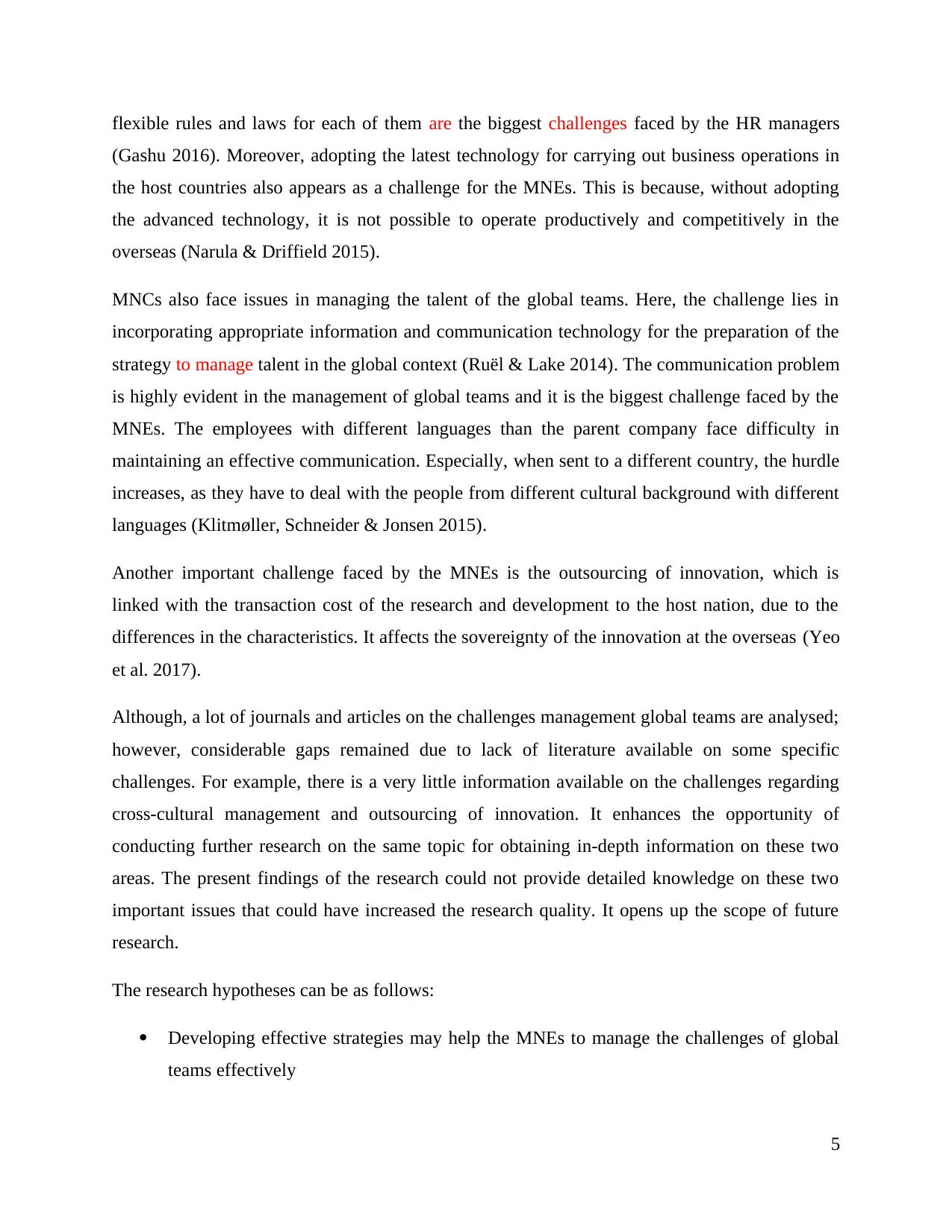
flexible rules and laws for each of them are the biggest challenges faced by the HR managers
(Gashu 2016). Moreover, adopting the latest technology for carrying out business operations in
the host countries also appears as a challenge for the MNEs. This is because, without adopting
the advanced technology, it is not possible to operate productively and competitively in the
overseas (Narula & Driffield 2015).
MNCs also face issues in managing the talent of the global teams. Here, the challenge lies in
incorporating appropriate information and communication technology for the preparation of the
strategy to manage talent in the global context (Ruël & Lake 2014). The communication problem
is highly evident in the management of global teams and it is the biggest challenge faced by the
MNEs. The employees with different languages than the parent company face difficulty in
maintaining an effective communication. Especially, when sent to a different country, the hurdle
increases, as they have to deal with the people from different cultural background with different
languages (Klitmøller, Schneider & Jonsen 2015).
Another important challenge faced by the MNEs is the outsourcing of innovation, which is
linked with the transaction cost of the research and development to the host nation, due to the
differences in the characteristics. It affects the sovereignty of the innovation at the overseas (Yeo
et al. 2017).
Although, a lot of journals and articles on the challenges management global teams are analysed;
however, considerable gaps remained due to lack of literature available on some specific
challenges. For example, there is a very little information available on the challenges regarding
cross-cultural management and outsourcing of innovation. It enhances the opportunity of
conducting further research on the same topic for obtaining in-depth information on these two
areas. The present findings of the research could not provide detailed knowledge on these two
important issues that could have increased the research quality. It opens up the scope of future
research.
The research hypotheses can be as follows:
Developing effective strategies may help the MNEs to manage the challenges of global
teams effectively
5
(Gashu 2016). Moreover, adopting the latest technology for carrying out business operations in
the host countries also appears as a challenge for the MNEs. This is because, without adopting
the advanced technology, it is not possible to operate productively and competitively in the
overseas (Narula & Driffield 2015).
MNCs also face issues in managing the talent of the global teams. Here, the challenge lies in
incorporating appropriate information and communication technology for the preparation of the
strategy to manage talent in the global context (Ruël & Lake 2014). The communication problem
is highly evident in the management of global teams and it is the biggest challenge faced by the
MNEs. The employees with different languages than the parent company face difficulty in
maintaining an effective communication. Especially, when sent to a different country, the hurdle
increases, as they have to deal with the people from different cultural background with different
languages (Klitmøller, Schneider & Jonsen 2015).
Another important challenge faced by the MNEs is the outsourcing of innovation, which is
linked with the transaction cost of the research and development to the host nation, due to the
differences in the characteristics. It affects the sovereignty of the innovation at the overseas (Yeo
et al. 2017).
Although, a lot of journals and articles on the challenges management global teams are analysed;
however, considerable gaps remained due to lack of literature available on some specific
challenges. For example, there is a very little information available on the challenges regarding
cross-cultural management and outsourcing of innovation. It enhances the opportunity of
conducting further research on the same topic for obtaining in-depth information on these two
areas. The present findings of the research could not provide detailed knowledge on these two
important issues that could have increased the research quality. It opens up the scope of future
research.
The research hypotheses can be as follows:
Developing effective strategies may help the MNEs to manage the challenges of global
teams effectively
5
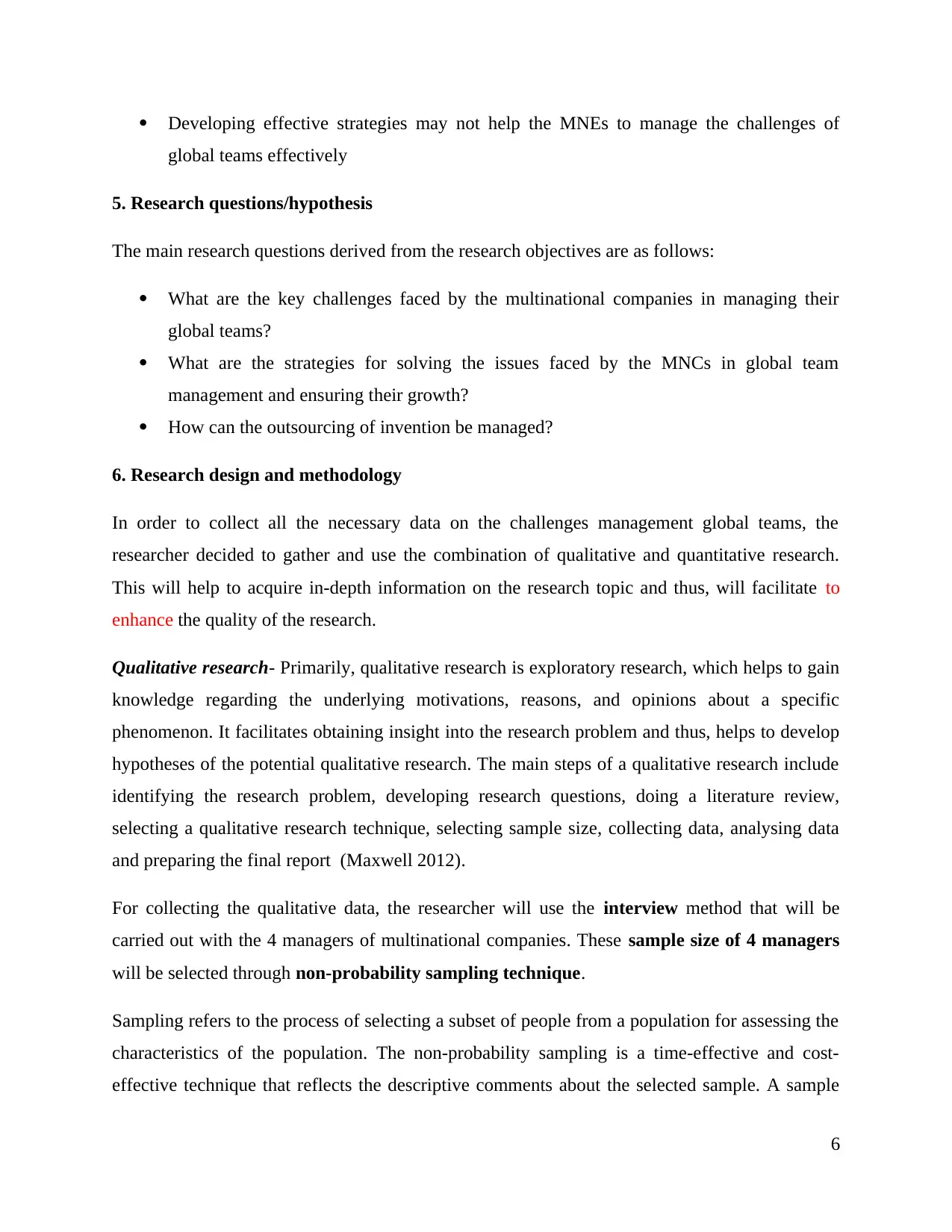
Developing effective strategies may not help the MNEs to manage the challenges of
global teams effectively
5. Research questions/hypothesis
The main research questions derived from the research objectives are as follows:
What are the key challenges faced by the multinational companies in managing their
global teams?
What are the strategies for solving the issues faced by the MNCs in global team
management and ensuring their growth?
How can the outsourcing of invention be managed?
6. Research design and methodology
In order to collect all the necessary data on the challenges management global teams, the
researcher decided to gather and use the combination of qualitative and quantitative research.
This will help to acquire in-depth information on the research topic and thus, will facilitate to
enhance the quality of the research.
Qualitative research- Primarily, qualitative research is exploratory research, which helps to gain
knowledge regarding the underlying motivations, reasons, and opinions about a specific
phenomenon. It facilitates obtaining insight into the research problem and thus, helps to develop
hypotheses of the potential qualitative research. The main steps of a qualitative research include
identifying the research problem, developing research questions, doing a literature review,
selecting a qualitative research technique, selecting sample size, collecting data, analysing data
and preparing the final report (Maxwell 2012).
For collecting the qualitative data, the researcher will use the interview method that will be
carried out with the 4 managers of multinational companies. These sample size of 4 managers
will be selected through non-probability sampling technique.
Sampling refers to the process of selecting a subset of people from a population for assessing the
characteristics of the population. The non-probability sampling is a time-effective and cost-
effective technique that reflects the descriptive comments about the selected sample. A sample
6
global teams effectively
5. Research questions/hypothesis
The main research questions derived from the research objectives are as follows:
What are the key challenges faced by the multinational companies in managing their
global teams?
What are the strategies for solving the issues faced by the MNCs in global team
management and ensuring their growth?
How can the outsourcing of invention be managed?
6. Research design and methodology
In order to collect all the necessary data on the challenges management global teams, the
researcher decided to gather and use the combination of qualitative and quantitative research.
This will help to acquire in-depth information on the research topic and thus, will facilitate to
enhance the quality of the research.
Qualitative research- Primarily, qualitative research is exploratory research, which helps to gain
knowledge regarding the underlying motivations, reasons, and opinions about a specific
phenomenon. It facilitates obtaining insight into the research problem and thus, helps to develop
hypotheses of the potential qualitative research. The main steps of a qualitative research include
identifying the research problem, developing research questions, doing a literature review,
selecting a qualitative research technique, selecting sample size, collecting data, analysing data
and preparing the final report (Maxwell 2012).
For collecting the qualitative data, the researcher will use the interview method that will be
carried out with the 4 managers of multinational companies. These sample size of 4 managers
will be selected through non-probability sampling technique.
Sampling refers to the process of selecting a subset of people from a population for assessing the
characteristics of the population. The non-probability sampling is a time-effective and cost-
effective technique that reflects the descriptive comments about the selected sample. A sample
6
⊘ This is a preview!⊘
Do you want full access?
Subscribe today to unlock all pages.

Trusted by 1+ million students worldwide
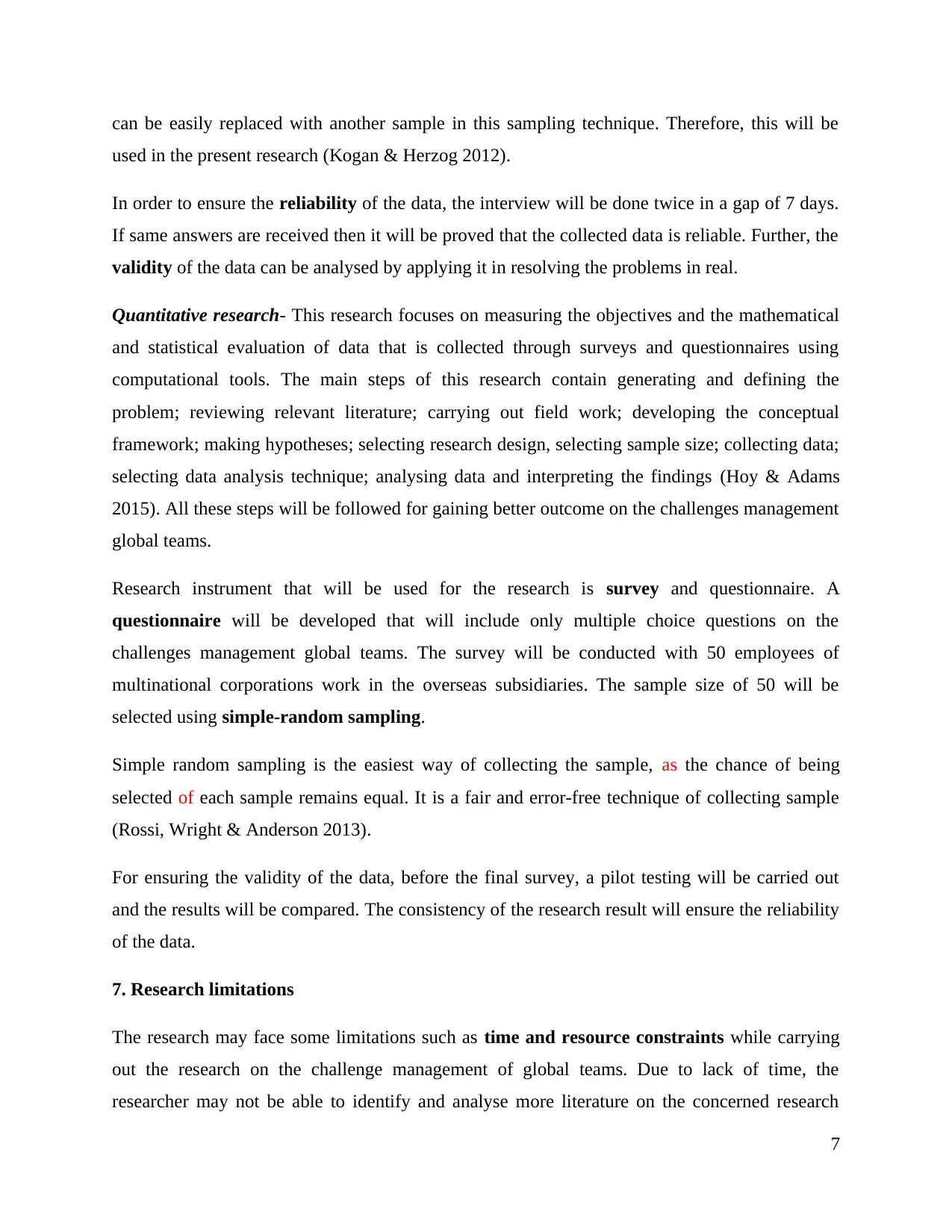
can be easily replaced with another sample in this sampling technique. Therefore, this will be
used in the present research (Kogan & Herzog 2012).
In order to ensure the reliability of the data, the interview will be done twice in a gap of 7 days.
If same answers are received then it will be proved that the collected data is reliable. Further, the
validity of the data can be analysed by applying it in resolving the problems in real.
Quantitative research- This research focuses on measuring the objectives and the mathematical
and statistical evaluation of data that is collected through surveys and questionnaires using
computational tools. The main steps of this research contain generating and defining the
problem; reviewing relevant literature; carrying out field work; developing the conceptual
framework; making hypotheses; selecting research design, selecting sample size; collecting data;
selecting data analysis technique; analysing data and interpreting the findings (Hoy & Adams
2015). All these steps will be followed for gaining better outcome on the challenges management
global teams.
Research instrument that will be used for the research is survey and questionnaire. A
questionnaire will be developed that will include only multiple choice questions on the
challenges management global teams. The survey will be conducted with 50 employees of
multinational corporations work in the overseas subsidiaries. The sample size of 50 will be
selected using simple-random sampling.
Simple random sampling is the easiest way of collecting the sample, as the chance of being
selected of each sample remains equal. It is a fair and error-free technique of collecting sample
(Rossi, Wright & Anderson 2013).
For ensuring the validity of the data, before the final survey, a pilot testing will be carried out
and the results will be compared. The consistency of the research result will ensure the reliability
of the data.
7. Research limitations
The research may face some limitations such as time and resource constraints while carrying
out the research on the challenge management of global teams. Due to lack of time, the
researcher may not be able to identify and analyse more literature on the concerned research
7
used in the present research (Kogan & Herzog 2012).
In order to ensure the reliability of the data, the interview will be done twice in a gap of 7 days.
If same answers are received then it will be proved that the collected data is reliable. Further, the
validity of the data can be analysed by applying it in resolving the problems in real.
Quantitative research- This research focuses on measuring the objectives and the mathematical
and statistical evaluation of data that is collected through surveys and questionnaires using
computational tools. The main steps of this research contain generating and defining the
problem; reviewing relevant literature; carrying out field work; developing the conceptual
framework; making hypotheses; selecting research design, selecting sample size; collecting data;
selecting data analysis technique; analysing data and interpreting the findings (Hoy & Adams
2015). All these steps will be followed for gaining better outcome on the challenges management
global teams.
Research instrument that will be used for the research is survey and questionnaire. A
questionnaire will be developed that will include only multiple choice questions on the
challenges management global teams. The survey will be conducted with 50 employees of
multinational corporations work in the overseas subsidiaries. The sample size of 50 will be
selected using simple-random sampling.
Simple random sampling is the easiest way of collecting the sample, as the chance of being
selected of each sample remains equal. It is a fair and error-free technique of collecting sample
(Rossi, Wright & Anderson 2013).
For ensuring the validity of the data, before the final survey, a pilot testing will be carried out
and the results will be compared. The consistency of the research result will ensure the reliability
of the data.
7. Research limitations
The research may face some limitations such as time and resource constraints while carrying
out the research on the challenge management of global teams. Due to lack of time, the
researcher may not be able to identify and analyse more literature on the concerned research
7
Paraphrase This Document
Need a fresh take? Get an instant paraphrase of this document with our AI Paraphraser
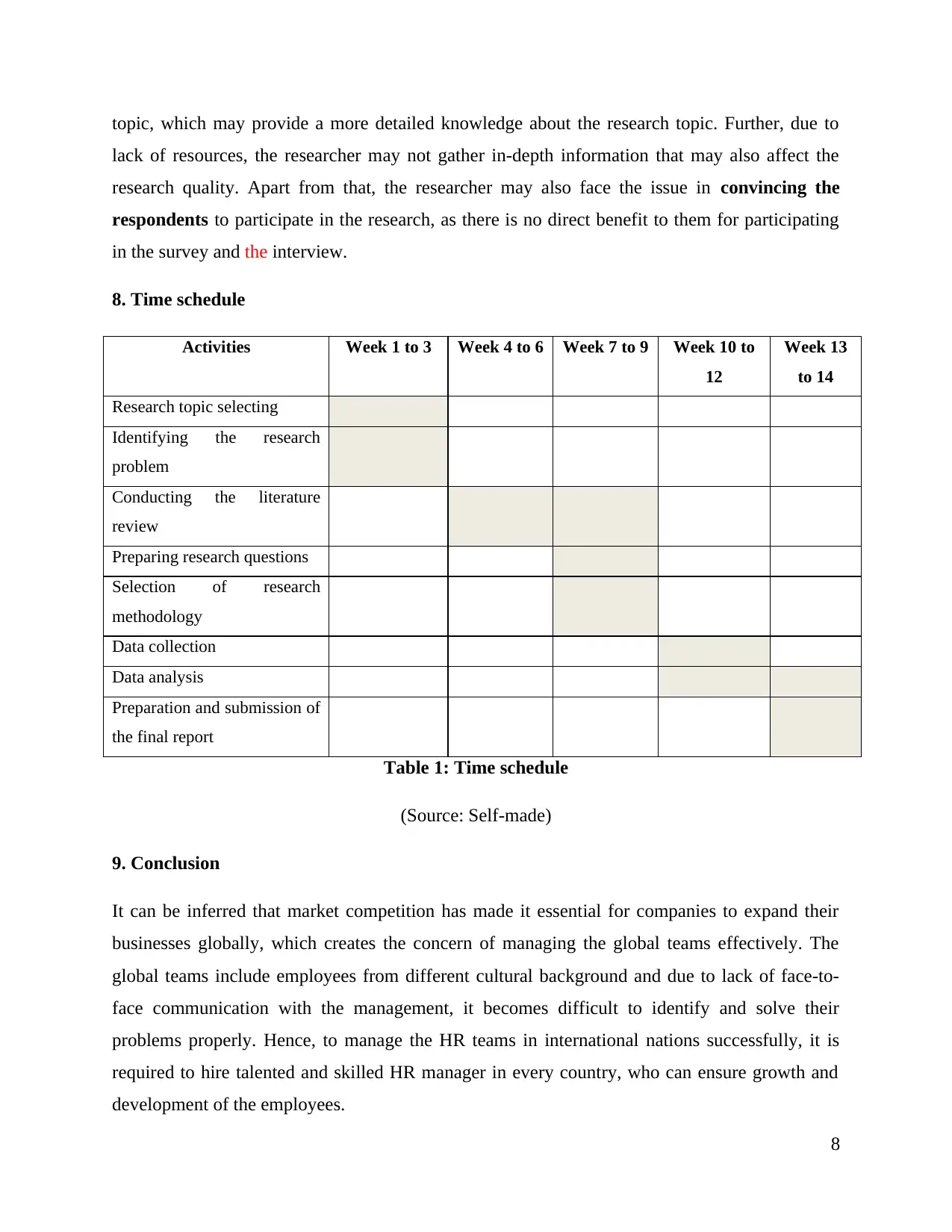
topic, which may provide a more detailed knowledge about the research topic. Further, due to
lack of resources, the researcher may not gather in-depth information that may also affect the
research quality. Apart from that, the researcher may also face the issue in convincing the
respondents to participate in the research, as there is no direct benefit to them for participating
in the survey and the interview.
8. Time schedule
Activities Week 1 to 3 Week 4 to 6 Week 7 to 9 Week 10 to
12
Week 13
to 14
Research topic selecting
Identifying the research
problem
Conducting the literature
review
Preparing research questions
Selection of research
methodology
Data collection
Data analysis
Preparation and submission of
the final report
Table 1: Time schedule
(Source: Self-made)
9. Conclusion
It can be inferred that market competition has made it essential for companies to expand their
businesses globally, which creates the concern of managing the global teams effectively. The
global teams include employees from different cultural background and due to lack of face-to-
face communication with the management, it becomes difficult to identify and solve their
problems properly. Hence, to manage the HR teams in international nations successfully, it is
required to hire talented and skilled HR manager in every country, who can ensure growth and
development of the employees.
8
lack of resources, the researcher may not gather in-depth information that may also affect the
research quality. Apart from that, the researcher may also face the issue in convincing the
respondents to participate in the research, as there is no direct benefit to them for participating
in the survey and the interview.
8. Time schedule
Activities Week 1 to 3 Week 4 to 6 Week 7 to 9 Week 10 to
12
Week 13
to 14
Research topic selecting
Identifying the research
problem
Conducting the literature
review
Preparing research questions
Selection of research
methodology
Data collection
Data analysis
Preparation and submission of
the final report
Table 1: Time schedule
(Source: Self-made)
9. Conclusion
It can be inferred that market competition has made it essential for companies to expand their
businesses globally, which creates the concern of managing the global teams effectively. The
global teams include employees from different cultural background and due to lack of face-to-
face communication with the management, it becomes difficult to identify and solve their
problems properly. Hence, to manage the HR teams in international nations successfully, it is
required to hire talented and skilled HR manager in every country, who can ensure growth and
development of the employees.
8
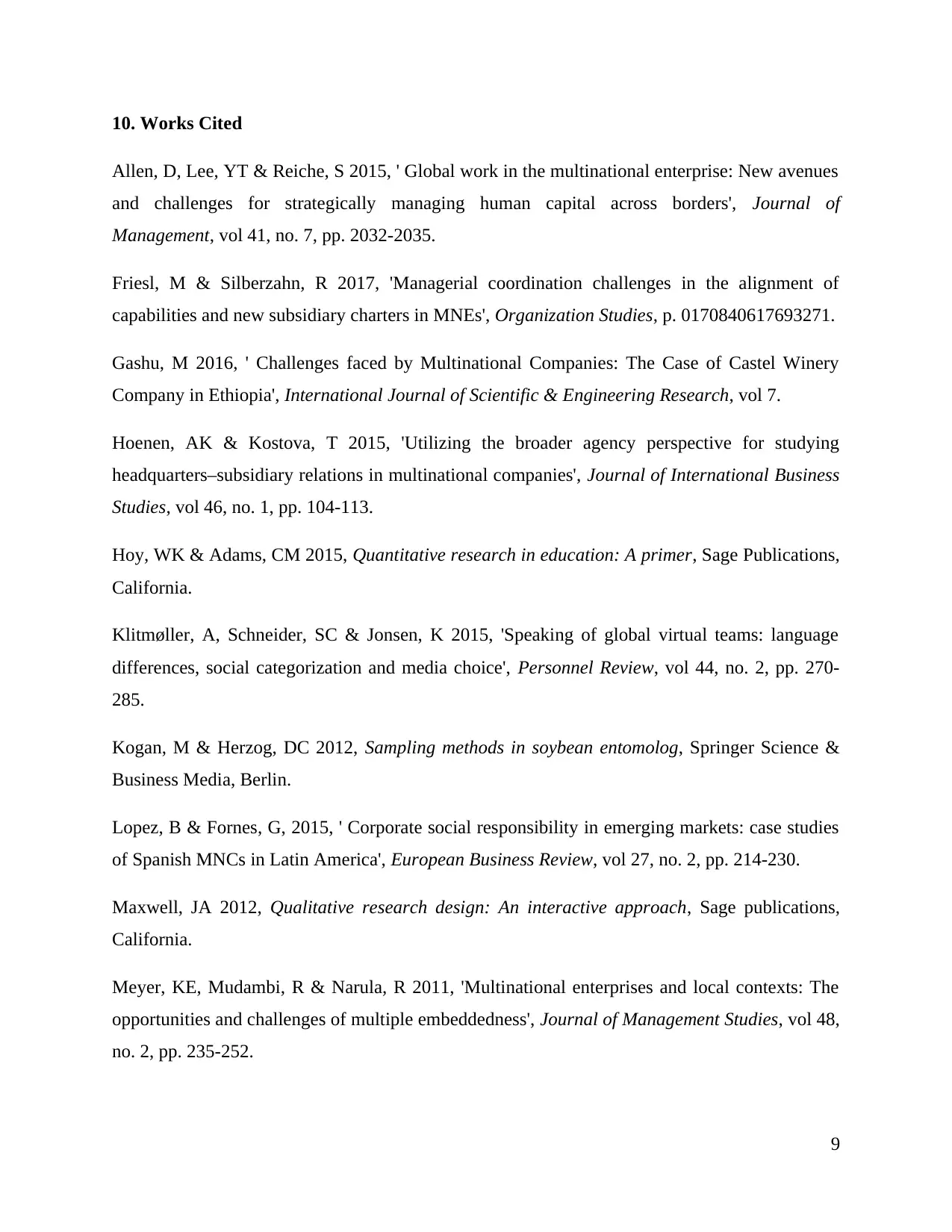
10. Works Cited
Allen, D, Lee, YT & Reiche, S 2015, ' Global work in the multinational enterprise: New avenues
and challenges for strategically managing human capital across borders', Journal of
Management, vol 41, no. 7, pp. 2032-2035.
Friesl, M & Silberzahn, R 2017, 'Managerial coordination challenges in the alignment of
capabilities and new subsidiary charters in MNEs', Organization Studies, p. 0170840617693271.
Gashu, M 2016, ' Challenges faced by Multinational Companies: The Case of Castel Winery
Company in Ethiopia', International Journal of Scientific & Engineering Research, vol 7.
Hoenen, AK & Kostova, T 2015, 'Utilizing the broader agency perspective for studying
headquarters–subsidiary relations in multinational companies', Journal of International Business
Studies, vol 46, no. 1, pp. 104-113.
Hoy, WK & Adams, CM 2015, Quantitative research in education: A primer, Sage Publications,
California.
Klitmøller, A, Schneider, SC & Jonsen, K 2015, 'Speaking of global virtual teams: language
differences, social categorization and media choice', Personnel Review, vol 44, no. 2, pp. 270-
285.
Kogan, M & Herzog, DC 2012, Sampling methods in soybean entomolog, Springer Science &
Business Media, Berlin.
Lopez, B & Fornes, G, 2015, ' Corporate social responsibility in emerging markets: case studies
of Spanish MNCs in Latin America', European Business Review, vol 27, no. 2, pp. 214-230.
Maxwell, JA 2012, Qualitative research design: An interactive approach, Sage publications,
California.
Meyer, KE, Mudambi, R & Narula, R 2011, 'Multinational enterprises and local contexts: The
opportunities and challenges of multiple embeddedness', Journal of Management Studies, vol 48,
no. 2, pp. 235-252.
9
Allen, D, Lee, YT & Reiche, S 2015, ' Global work in the multinational enterprise: New avenues
and challenges for strategically managing human capital across borders', Journal of
Management, vol 41, no. 7, pp. 2032-2035.
Friesl, M & Silberzahn, R 2017, 'Managerial coordination challenges in the alignment of
capabilities and new subsidiary charters in MNEs', Organization Studies, p. 0170840617693271.
Gashu, M 2016, ' Challenges faced by Multinational Companies: The Case of Castel Winery
Company in Ethiopia', International Journal of Scientific & Engineering Research, vol 7.
Hoenen, AK & Kostova, T 2015, 'Utilizing the broader agency perspective for studying
headquarters–subsidiary relations in multinational companies', Journal of International Business
Studies, vol 46, no. 1, pp. 104-113.
Hoy, WK & Adams, CM 2015, Quantitative research in education: A primer, Sage Publications,
California.
Klitmøller, A, Schneider, SC & Jonsen, K 2015, 'Speaking of global virtual teams: language
differences, social categorization and media choice', Personnel Review, vol 44, no. 2, pp. 270-
285.
Kogan, M & Herzog, DC 2012, Sampling methods in soybean entomolog, Springer Science &
Business Media, Berlin.
Lopez, B & Fornes, G, 2015, ' Corporate social responsibility in emerging markets: case studies
of Spanish MNCs in Latin America', European Business Review, vol 27, no. 2, pp. 214-230.
Maxwell, JA 2012, Qualitative research design: An interactive approach, Sage publications,
California.
Meyer, KE, Mudambi, R & Narula, R 2011, 'Multinational enterprises and local contexts: The
opportunities and challenges of multiple embeddedness', Journal of Management Studies, vol 48,
no. 2, pp. 235-252.
9
⊘ This is a preview!⊘
Do you want full access?
Subscribe today to unlock all pages.

Trusted by 1+ million students worldwide
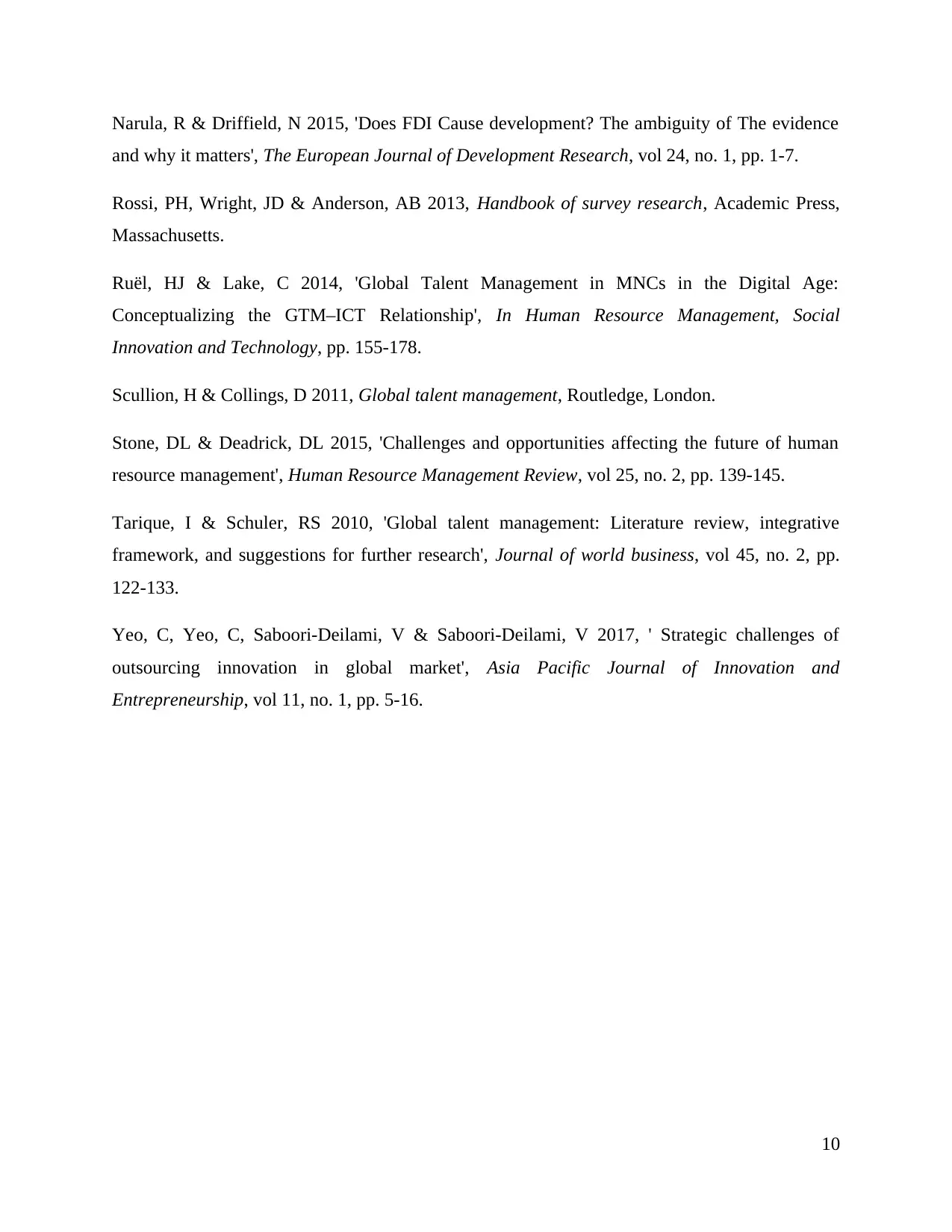
Narula, R & Driffield, N 2015, 'Does FDI Cause development? The ambiguity of The evidence
and why it matters', The European Journal of Development Research, vol 24, no. 1, pp. 1-7.
Rossi, PH, Wright, JD & Anderson, AB 2013, Handbook of survey research, Academic Press,
Massachusetts.
Ruël, HJ & Lake, C 2014, 'Global Talent Management in MNCs in the Digital Age:
Conceptualizing the GTM–ICT Relationship', In Human Resource Management, Social
Innovation and Technology, pp. 155-178.
Scullion, H & Collings, D 2011, Global talent management, Routledge, London.
Stone, DL & Deadrick, DL 2015, 'Challenges and opportunities affecting the future of human
resource management', Human Resource Management Review, vol 25, no. 2, pp. 139-145.
Tarique, I & Schuler, RS 2010, 'Global talent management: Literature review, integrative
framework, and suggestions for further research', Journal of world business, vol 45, no. 2, pp.
122-133.
Yeo, C, Yeo, C, Saboori-Deilami, V & Saboori-Deilami, V 2017, ' Strategic challenges of
outsourcing innovation in global market', Asia Pacific Journal of Innovation and
Entrepreneurship, vol 11, no. 1, pp. 5-16.
10
and why it matters', The European Journal of Development Research, vol 24, no. 1, pp. 1-7.
Rossi, PH, Wright, JD & Anderson, AB 2013, Handbook of survey research, Academic Press,
Massachusetts.
Ruël, HJ & Lake, C 2014, 'Global Talent Management in MNCs in the Digital Age:
Conceptualizing the GTM–ICT Relationship', In Human Resource Management, Social
Innovation and Technology, pp. 155-178.
Scullion, H & Collings, D 2011, Global talent management, Routledge, London.
Stone, DL & Deadrick, DL 2015, 'Challenges and opportunities affecting the future of human
resource management', Human Resource Management Review, vol 25, no. 2, pp. 139-145.
Tarique, I & Schuler, RS 2010, 'Global talent management: Literature review, integrative
framework, and suggestions for further research', Journal of world business, vol 45, no. 2, pp.
122-133.
Yeo, C, Yeo, C, Saboori-Deilami, V & Saboori-Deilami, V 2017, ' Strategic challenges of
outsourcing innovation in global market', Asia Pacific Journal of Innovation and
Entrepreneurship, vol 11, no. 1, pp. 5-16.
10
Paraphrase This Document
Need a fresh take? Get an instant paraphrase of this document with our AI Paraphraser

11
1 out of 11
Related Documents
Your All-in-One AI-Powered Toolkit for Academic Success.
+13062052269
info@desklib.com
Available 24*7 on WhatsApp / Email
![[object Object]](/_next/static/media/star-bottom.7253800d.svg)
Unlock your academic potential
Copyright © 2020–2026 A2Z Services. All Rights Reserved. Developed and managed by ZUCOL.




